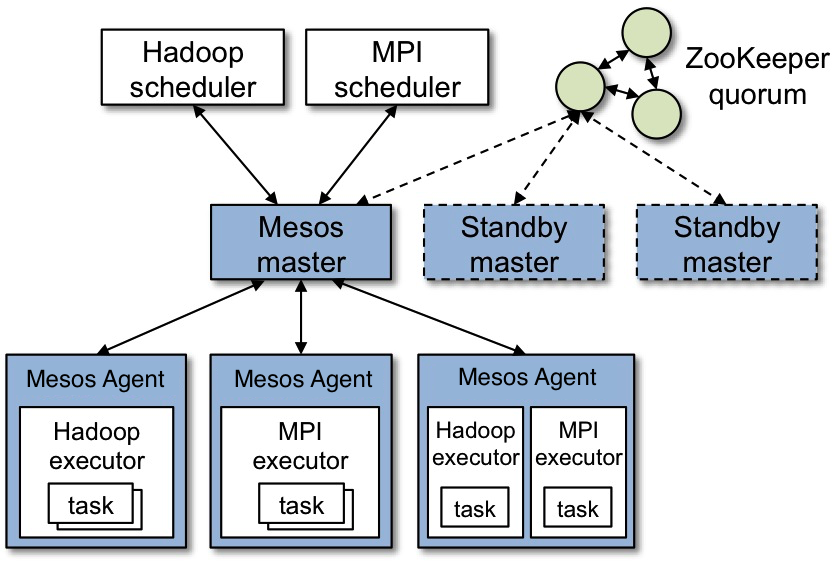Understanding Apache Mesos - A Comprehensive Guide for Data Engineers
Apache Mesos is a distributed systems kernel that enables efficient, dynamic and scalable allocation and management of applications and resources in large-scale data centers. Data engineers use Mesos to run big data applications, manage distributed data processing and deliver distributed systems. In this comprehensive guide, we'll take a deep dive into understanding Apache Mesos, its architecture, how it works and its use cases.
Mesos Architecture
Mesos is built on a master-slave architecture that has both a master node and multiple slave nodes. The master node is responsible for resource allocation and managing slaves, while the slave nodes are responsible for executing tasks assigned to them.

The master node schedules tasks on the slave nodes based on the resources available to the cluster. It also collects resource utilization metrics and manages the slave nodes for failure detection and recovery.
Mesos API
Mesos has a flexible API that allows third-party applications to register with Mesos and receive offers for available resources. Applications can submit resource offers back to the Mesos master node, and then the master node decides where to run the application tasks based on the available resources.
Mesos Frameworks
Mesos provides a robust set of frameworks that let developers build applications to run on Mesos. Here are some common frameworks used in the industry:
Marathon
Marathon is a framework that provides a REST API for deploying and running long-running services on Mesos. It allows operators to deploy, run, and scale containerized services and applications.
Chronos
Chronos is a distributed cron-like system that schedules and runs jobs on Mesos. It allows operators to define and manage workflows and dependencies between jobs.
Spark
Apache Spark is a big data processing engine that runs on Mesos. It enables data engineers to process large volumes of data using distributed computing techniques.
Kubernetes
Kubernetes is a container orchestration platform that enables the deployment, scaling, and management of containerized applications on Mesos.
Mesos Use Cases
Mesos is used by a wide range of organizations to manage and deploy applications at scale. Here are some use cases of Mesos in the industry:
Big Data Processing
Mesos is an ideal platform for running big data applications such as Spark, Hadoop, and Cassandra. Mesos provides the necessary abstraction and resource isolation to run big data applications efficiently.
Microservices
Mesos provides the necessary framework to run microservices at scale. It allows operators to deploy and manage containerized applications efficiently.
Resource Utilization
Mesos provides a flexible and efficient way to manage and allocate resources in a large-scale data center. It enables operators to optimize resource utilization and reduce costs.
Infrastructure Management
Mesos enables operators to manage infrastructure efficiently, allowing them to provision and configure resources quickly.
Conclusion
Apache Mesos is a powerful distributed systems kernel that enables data engineers to run big data applications, manage distributed data processing and deliver distributed systems at scale. Its flexible API and framework support make it an ideal platform for running complex applications in production. As a data engineer, understanding Apache Mesos is a must-have skill in your toolkit.
Category: Distributed Systems